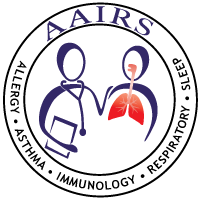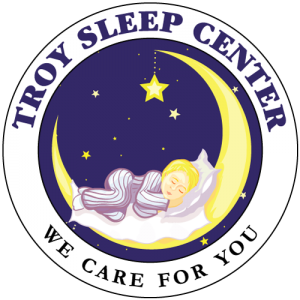Polysomnogram: This painless, noninvasive test monitors brain waves, breathing patterns, heart activity, and body movements during an all-night sleep period. The recorded patterns are then studied by our sleep physician, who diagnoses the different types of sleep disorders.
Multiple sleep latency test: This assessment is usually performed the day after the polysomnogram is administered. It is also useful to study the intensity of daytime sleepiness and to determine if narcolepsy is present.
Continuous positive air pressure and bi-level positive airway pressure (CPAP/BiPAP) test: This test is often requested in the adult patient after he or she has been diagnosed with obstructive sleep apnea. In children, the CPAP/BiPAP test may be indicated if adenotonsillectomy (removal of adenoids and tonsils) is not indicated or was not successful in treating obstructive sleep apnea. During this test, a mask is placed over the nose and/or face to help prevent snoring and apnea (interrupted breathing) during the normal sleep period. Different levels of air pressure are gradually delivered to the airway to help open the airway passages during sleep to assist in maintaining a normal sleep cycle. This test is used to determine the correct air pressure needed to keep the airways open. Consistent use of the CPAP or BiPAP machine is critical in the successful treatment of sleep apnea. Practice with the mask may be necessary prior to coming to the sleep clinic for this test.
In Lab Sleep Testing
New in 2014, The Troy Sleep Center has built another state of the art sleep testing facility. The Troy location has 5 exam rooms and a 4 bedroom sleep lab. Each of the sleep testing suites in our lab are clean, private, and secure. Each sleep suite has an attached bathroom, two with full showers.
Our board certified physicians and registered sleep technologists are in the office 24-hours a day to ensure all sleep testing patients are cared for and made to feel comfortable during their stay.
We also offer the following accommodations to make your sleep testing a comfortable experience:
Preparing for an In-Lab Sleep Test
Our sleep technicians are trained to help you feel safe, secure, and prepared for your study. A technician will guide you through the testing process and be available to you throughout to monitor your sleep, make any necessary adjustments to improve your comfort, and answer any questions you may have. During this study, your sleep is monitored to measure sleep/wake patterns, brain wave activity, muscle activity, eye movement, blood oxygen levels, heart rate, and breathing rate. This information is analyzed and interpreted by our board certified sleep physicians and reported to your referring doctor with a recommended course of treatment.
What To Bring
- Parent or guardian, if patient is less than 18 years of age
- Insurance card, social security number, name and date of birth of insured
- 2-piece (loose and comfortable) cotton sleepwear
- Socks or house shoes
- Overnight toiletries
- Change of clothes for the following morning
- A favorite pillow, blanket, or stuffed toy
- Favorite bedtime DVD (age-appropriate)
- CPAP/BiPAP mask and portable oxygen, if applicable
Before Your In-Lab Sleep Testing
- Patient should follow a normal sleep routine 48 hours prior to study.
- Patient should avoid caffeine for 48 hours prior to study.
- Patient and caregiver should eat dinner before arriving.
- Patient needs to continue regular medications as prescribed unless otherwise directed by patient’s physician.
- Patient should bring any overnight medications with him or her, in original bottles with labels.
- Patient should arrive bathed, with clean hair. Hair gels, sprays, and other oily substances should not be used.
- Medications are not available and are not administered by staff.
During Your In-Lab Sleep Testing
If the patient is under 18 years old, we require one parent or guardian to stay with the child during evaluation.
Your sleep technician confirms the patient’s medical history and asks you questions about sleep symptoms, sleep behaviors, and activities. The technician is also available to answer questions about the sleep study.
Two patient suites with different color and theme options are available. Whenever possible, we will accommodate your choice: You will be taken to your comfortable suite where you can begin your evening routine.
After you’ve had time to get comfortable and your sleep technician has completed the necessary paperwork, he or she will attach approximately 10 monitors to your head, neck, chest, and legs. Our technicians are experienced in placing these monitors on patients of all ages and developmental backgrounds.
The monitors are small, round and painless and are easily removed after the study is complete. A belt goes around your abdomen and chest, and a pulse oximeter is placed around a finger (or foot) to monitor oxygen levels. Lastly, a nasal cannula monitor is placed under your nose to monitor nasal breathing. It is best to have a two-piece garment or button top for this portion of the study.
Lights are dimmed between 9:00 and 10:00 p.m. in your bedroom based on your preference. Your sleep technician may adjust monitors or other equipment in your suite throughout the duration of the study.
Your sleep study should conclude around 5:30 to 6:00 a.m. The sleep technician will enter to remove all of the monitors. You will be asked to complete a brief discharge questionnaire regarding the study before you leave.
After Your In-Lab Sleep Testing
It takes our Medical Director some time to review and interpret the hundreds of pages of data from your study. Your provider will be able to go over your results during your follow-up appointment.
To receive results, contact your doctor. If you have further questions regarding the study and its results, appointments are available with our sleep specialist. Our technicians are not authorized to discuss their observations regarding your symptoms. This information must come from your physician.
Home Sleep Testing
AAIRS Clinics offers Home Sleep Studies. Our nationally recognized, board certified sleep medicine physician’s will be able to evaluate if you have Obstructive Sleep Apnea (OSA). Home sleep testing allows you to sleep at home wearing equipment that collects information about your breathing patterns during sleep.
Our home sleep test devices measure your breathing, snoring, blood oxygen level and your heart rate.
Many physicians recommend home sleep testing if:
- It is highly likely that you have moderate to severe obstructive sleep apnea
- You have no significant medical conditions other than the suspected obstructive sleep apnea

